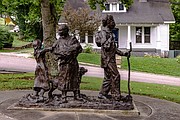A Question of Justice
Jesse Jackson | 9/29/2022, 9:32 a.m.
In 1838, in a shameful chapter of American history, U.S. forces under Gen. Winfield Scott forced tens of thousands of Cherokee Indians - one of the "Five Civilized Tribes" that had embraced the customs and language of white settlers - to march 1,200 miles to what was designated "Indian Territory" across the Mississippi (centered in what is now Oklahoma). Their lands were confiscated; their homes looted. Along what became known as the Trail of Tears, whooping cough, typhus, dysentery, and starvation took a deadly toll, with an estimated one-quarter of the Cherokee people perishing along the way.
The U.S. government claimed that an 1835 agreement with Cherokee leaders - the Treaty of New Echota - provided the terms for forcibly removing the Cherokee and confiscating their land, which was in high demand by white plantation owners seeking to expand their cotton fields. As part of the treaty, the U.S. government explicitly guaranteed the Cherokee people a seat in the U.S. Congress.
Nearly 200 years later, that legal promise goes unfulfilled. It is far past time for the U.S. to fulfill its promise. The Cherokee Nation has designated a delegate - Kim Teehee, an experienced leader who has worked on Capitol Hill and in the Obama administration. The treaty provision is an explicit promise only to the Cherokee nation. Yet because of the importance of having a seat at the table in Congress, the National Congress of American Indians has united behind the call to fulfill the promise.
This is a question of honor. A treaty is a legal promise; breaking it is breaking the law. For the U.S., which prides itself as championing a "rules-based international order," not honoring that promise is a glaring violation of our own principles.
This is a question of justice. The Trail of Tears was a brutal act of terror enforced on a proud people that, ironically, were among the Native American leaders in seeking to make peace with the new American settlers. The injustice inflicted upon them did not end with their arrival in what was known as "Indian Territory." The condition of Native Americans in America continues to be appalling to this day.
From 2019 to 2021 as COVID raged across the country, the life expectancy of Native Americans plummeted from 71.8 years to 65.2, an unprecedented and staggering decline. COVID preyed on the most vulnerable. Native Americans had higher rates of vaccination than African Americans or Hispanics. But they suffer far higher rates of poverty, far worse access to health care, and as a direct result greater numbers of pre-existing conditions like obesity and diabetes. The result was a modern-day Trail of Tears.
Needless to say, having a delegate in Congress won't correct that reality. But it will provide Native Americans with a voice so that their reality does not go unnoticed. It would give them the opportunity to build coalitions and advance legislation to address this shameful reality.
This is also a question of wisdom. At a time when zealots seek to drive America apart, to turn whites against people of color, natives against immigrants, Christians against Jews and Muslims, fulfilling the treaty promise would be an expression of simple wisdom. We all do better when we all do better. Giving the Cherokee Nation a seat in the Congress would not only fulfill a treaty promise, but it would also symbolize that reality.
According to the provisions of the treaty, creating the promised seat in the Congress requires only a vote of the House of Representatives. The delegate would be non-voting but could sit on committees and speak from the floor of Congress. House Speaker Nancy Pelosi has expressed her support. Now is the time to act. This fall, the Rules Committee - chaired by Rep. Jim McGovern - should convene a hearing to forward a resolution to create the seat. The House of Representatives should formally vote to create the seat. Both the speaker and Rep. McGovern should be flooded with messages urging them to act.
November is designated as Native American Heritage Month. There can be few better ways to recognize it than to honor a nearly 200-year-old legal obligation, and create the congressional seat promised to those who were in this nation long before the Pilgrims arrived.
You can write to the Rev. Jesse Jackson in care of this newspaper or by email at jjackson@rainbowpush.org. Follow him on Twitter @RevJJackson.





